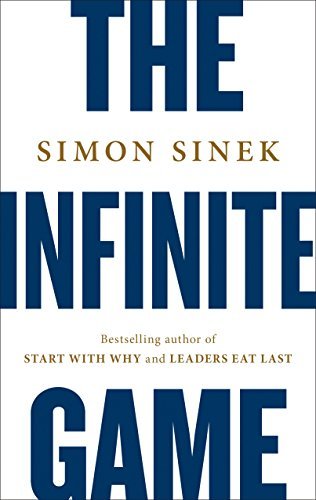
The Infinite Game
Simon Sinek
About the Author

Simon Sinek
Questions & Answers
The fundamental difference between finite and infinite games lies in their objectives and duration. Finite games have clear, defined endpoints and winners, while infinite games have no clear endpoint and no single winner. In business and leadership, this distinction is crucial.
Infinite games focus on long-term, sustainable success and the advancement of a cause or vision that transcends the company's existence. This approach fosters innovation, trust, and resilience, as leaders prioritize the well-being of employees, customers, and the community. Infinite-minded leaders build strong cultures, inspire loyalty, and create enduring value.
On the other hand, finite games prioritize short-term gains and competition, often at the expense of long-term sustainability. This mindset can lead to unethical practices, eroded trust, and a decline in innovation. Finite-minded leaders may achieve short-term success, but they risk the long-term viability of their organizations.
In summary, the distinction between finite and infinite games in business and leadership revolves around the focus on immediate gains versus the pursuit of a lasting, meaningful vision. Infinite games are more likely to lead to sustainable success and positive societal impact.
A "Just Cause" is crucial for an organization's success in the Infinite Game as it provides a clear, inspiring vision that transcends short-term goals. It serves as a guiding principle that motivates employees, attracts customers, and retains investors. An effective Just Cause has several characteristics:
- Inclusive: It should appeal to a broad audience, inspiring a diverse group of people to contribute.
- Service-Oriented: The primary benefit should be for others, not just the organization itself, fostering a culture of service and loyalty.
- Resilient: It should be timeless and adaptable, able to endure changes in technology, politics, and culture.
- Written: A written statement of the Just Cause ensures clarity and continuity, guiding future generations.
- Avoids False Causes: It should not be a moon shot, a pursuit of being the best, or mere growth; instead, it should be a vision of a better future that the organization is committed to advancing.
By embodying these traits, a Just Cause helps an organization stay focused on its long-term goals, fostering a culture of continuous improvement and resilience, which are essential for success in the Infinite Game.
Shifting from a finite to an infinite mindset in business and leadership has profound implications. A finite mindset, focused on short-term gains and competition, often leads to tunnel vision, ethical lapses, and organizational decay. In contrast, an infinite mindset prioritizes long-term vision, resilience, and the well-being of stakeholders.
This shift benefits organizations by fostering innovation, trust, and loyalty. Infinite-minded leaders build resilient companies that adapt to change, survive crises, and thrive over time. They prioritize the well-being of employees, customers, and communities, leading to higher engagement and productivity.
For society, this shift promotes sustainable practices, ethical business conduct, and a shared sense of purpose. It encourages collaboration and mutual growth, contributing to a more equitable and prosperous world. Overall, adopting an infinite mindset in business and leadership can lead to more sustainable, ethical, and successful organizations, ultimately benefiting society as a whole.
Leaders can foster trust and ethical behavior by prioritizing a "Just Cause" over short-term gains, building "Trusting Teams," and demonstrating integrity. They should create a "Circle of Safety" where vulnerability is encouraged, and mistakes are seen as learning opportunities. By focusing on the well-being of employees and the community, leaders can establish a culture where ethical behavior is the norm.
Neglecting these aspects can lead to ethical fading, where individuals rationalize unethical actions due to pressure or perceived norms. This can result in a toxic work environment, decreased productivity, and reputational damage. Companies like Wells Fargo and Mylan illustrate the consequences of ethical fading, including financial penalties, loss of customer trust, and even the collapse of the company. Conversely, organizations like Patagonia, which prioritize ethical behavior and a sustainable future, can achieve long-term success and build a loyal customer base.
In the Infinite Game, "Worthy Rivals" play a crucial role in fostering improvement and innovation. They are competitors or adversaries who excel in certain areas, pushing an organization to constantly improve and innovate. By acknowledging and studying these rivals, organizations can:
- Identify Weaknesses: Worthy Rivals reveal areas where an organization falls short, prompting it to enhance its strengths and develop new capabilities.
- Inspire Continuous Improvement: The presence of a strong rival motivates an organization to stay ahead, driving a culture of continuous improvement and innovation.
- Enhance Ethical Standards: Viewing rivals as adversaries rather than enemies encourages ethical behavior and fair competition, reducing the likelihood of unethical practices.
- Clarify Vision and Purpose: Rivals can help clarify an organization's mission and values by providing a clear contrast and a benchmark for excellence.
- Promote Adaptability: The competition with a worthy rival encourages an organization to be more flexible and adaptable, allowing it to evolve and thrive in changing environments.
In summary, Worthy Rivals serve as a catalyst for growth, pushing organizations to be their best and ensuring they remain competitive and innovative in the long term.